Distell sells venerable wine farms and brands
CEO Richard Rushton says the company has already sold the La Bonheur and Stellenzicht wine farms and brands. Remgro-controlled liquor conglomerate Distell, which aims to double revenue and profits by 2021, is selling long-held wine farms and wine brands as executives look to markedly improve a modest return on assets.
Speaking at an investment presentation on results for the year to June on Thursday, CEO Richard Rushton said Distell had already sold the La Bonheur and Stellenzicht wine farms and brands — both formed part of the Lusan premium wine estate.
Rushton said the company’s premium wine offering would concentrate on four key brands: Nederburg, Fleur du Cap, Alto and Durbanville Hills.
Allersverloren and Plaisir de Merle were likely to be retained.
Distell owns an array of best-selling wine brands, including premium brands such as Zonnebloem, Uitkyk and Jacobsdal.
Rushton said the honing of the wine portfolio was a significant decision with certain farms and brands enduring a five-decade relationship with Distell.
But he was reluctant to divulge further detail on the process: "You can draw your own conclusions, but an announcement is imminent. "Agreements are significantly advanced on what [wine] assets we will be left with."
Distell financial director Lucas Verwey said the wine-asset sales incolved a small part of Distell’s R15bn assets.
"We are probably talking around R500m, which represents around 3% to 4% of our assets," he said.
Rushton said that although the quantum of assets was relatively small the development meant considerably less management time and resources needed to be spread across these assets. "It allows us to redouble our efforts on our winning wine brands that we are confident of growing strongly in the longer term," he said.
Opportune Investments CEO and long-time Distell shareholder Chris Logan said the culling of the wine brands was long overdue. "It makes sense to concentrate your firepower in your top brands.
"They seem to be following in the footsteps of Australia’s Treasury Wines, which has enjoyed much success in recent years."
In the year under review Distell, with headline earnings down 3.6% to R1.6bn, again enoyed category-beating wine sales. Rushton reported double-digit growth in the popular and price-friendly 4th Street brand. He said 4th Street was now ranked as one of the fastest-growing wine brands, but conceded the growth trend was slowing off a high base.
The overall wine performance was also supported by solid revenue growth in stalwart brands Tassenberg and Paarl Perlé. In the premium category, Distell had double-digit growth across multiple countries.
Distell’s cider business — centred on Hunters and Savanna — showed up well in spite of increased competition from beer, near-beer products and new ready-to-drink (RTD) launches. Distell’s cider and RTDs segment maintained volume but managed to increase revenue and gross profit 5.5% and 3.3% respectively.
Cider and RTDs now represent 51.5% of Distell’s volume, 36.6% of revenue and 31.2% of gross profit.
Rushton said the cider segment responded to extra competition by innovating with varieties and packaging, citing the launch of Savanna Loco and a new 50ml bottle.
Asked about funding plans if Distell decided to make a large acquisition offshore, Rushton said the company would opt to raise capital.
News Category
- International retailers
- On the move
- Awards and achievements
- Legislation
- Wine and liquor
- Africa
- Going green
- Supplier news
- Research tools
- Retailer trading results
- Supply chain
- Innovation and technology
- Economic factors
- Crime and security
- Store Openings
- Marketing and Promotions
- Social Responsibility
- Brand Press Office
Related Articles

Makro secures exclusive rights to SA’s most sou...

Checkers adds 41 new wines to Odd Bins range

With petrol at almost R20 a litre, food prices ...

Petrol price shocker for South Africa


